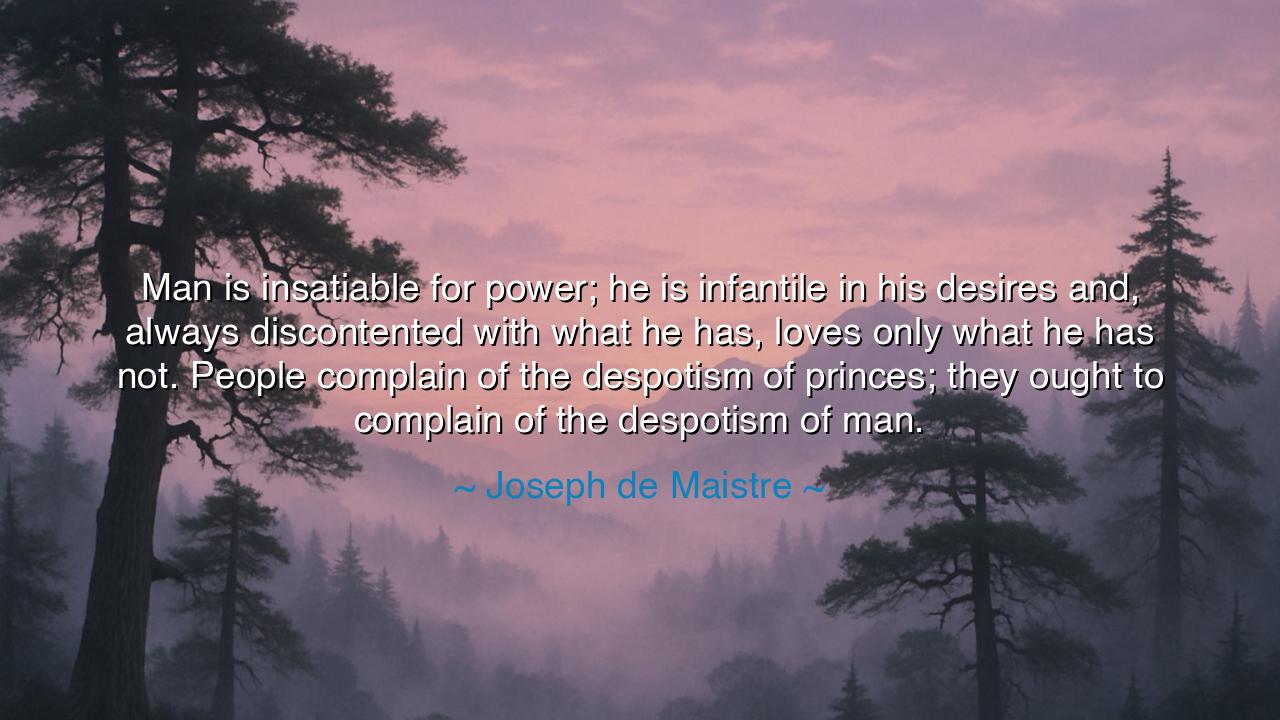
Man is insatiable for power; he is infantile in his desires and
Man is insatiable for power; he is infantile in his desires and, always discontented with what he has, loves only what he has not. People complain of the despotism of princes; they ought to complain of the despotism of man.






Joseph de Maistre, a thinker of profound insight, spoke with the weight of generations of reflection when he declared: “Man is insatiable for power; he is infantile in his desires and, always discontented with what he has, loves only what he has not. People complain of the despotism of princes; they ought to complain of the despotism of man.” In this powerful observation, de Maistre unveils the eternal flaw of human nature: a relentless hunger for power and a restless discontent with what is, always reaching for what is beyond his grasp. He reminds us that the despotism we face is not solely that of kings or rulers, but of the very desires and ambitions that reside within every human soul.
The meaning of this quote is as old as civilization itself. Man—the creature who builds kingdoms and empires, who raises towering monuments and writes grand histories—remains infantile in his inner needs. Like a child, he is never satisfied with the bounty before him, always yearning for more, for what lies beyond. This craving for what is not his, for power unearned, is the true despotism, for it controls the soul, driving it to acts of folly and violence. In this way, the despotism of man is far more dangerous than the tyranny of any ruler, for it infects the heart of all men, regardless of station.
History provides us with ample examples of this insatiable hunger. Consider the French Revolution, where the masses, discontented with the monarchy, overthrew the system only to replace it with a new kind of despotism. The revolutionaries, in their thirst for freedom, found themselves devoured by their own desires, leading to the Reign of Terror under Robespierre. In their pursuit of a better world, they created one far worse. The despotism of the people, fueled by their own discontent and desire for something greater, became their own prison.
This same hunger for power is evident in the rise and fall of empires. The Roman Empire, in its infancy, was driven by ideals of glory and expansion, yet as it grew, so too did the insatiable lust for more—more land, more riches, more power. In time, the very empire that once promised stability became corrupt, its leaders consumed by their own unchecked desires, leading to its eventual collapse. This tragic cycle echoes de Maistre’s warning: the despotism of the individual—be it a ruler or a citizen—is the true force that shapes history, often more than any one tyrant.
Therefore, let the seeker of wisdom understand that true freedom lies not in the overthrow of rulers but in the mastery over one's own desires. The despotism of man is the greatest tyrant of all. If we are to live in harmony, we must first conquer the desires that threaten to enslave us, understanding that the power we crave will only ever bind us further. De Maistre’s words call us to look inward, to examine the infantile nature of our wants, and to realize that it is not the kings or princes who hold the greatest power over us—but ourselves.






Hhuyentran
This perspective makes me reflect on history and contemporary politics. Are revolutions and social movements driven more by the despotism of individuals or by systemic inequalities? Could it be that Maistre is suggesting that the real danger lies within the collective human psyche rather than any specific ruler or institution? I’d like to explore how his philosophy might inform modern governance, especially in balancing personal ambition with societal stability.
CTko cs ten
Reading this, I feel a tension between pessimism and realism. Does Maistre’s view imply that human desire is eternally unfulfillable, and if so, what role do ethics or cultural norms play in mitigating selfishness? How might societies channel the restless nature of people constructively rather than letting it manifest as tyranny? I’m curious if he sees philosophical, religious, or educational methods as viable tools to restrain our innate power hunger.
DCDang Duc Cuong
I’m intrigued by the implication that ordinary individuals, not just rulers, are capable of despotism. Does this mean that democratic systems are just as vulnerable as monarchies to the tyranny of personal ambition? Could Maistre’s perspective suggest that social and political equality might unintentionally amplify human discontent? I’d like to hear more about how he distinguishes between the destructive desire for power and legitimate aspirations or leadership qualities.
TTLe Tien Thanh
This statement makes me question the balance between personal responsibility and systemic influence. If people are inherently desiring and discontent, should political systems be designed to limit their influence over others, or should education and morality be the focus to temper these tendencies? I’d like to explore whether Maistre sees the solution in external control, internal cultivation of virtue, or if he considers human nature essentially ungovernable.
HTBich Truyen Huynh Thi
I find myself wondering about the psychological dimension of this idea. Is our constant desire for what we do not have purely a flaw, or could it be an engine for innovation and progress? How does Maistre reconcile human ambition with the potential for creativity and achievement? Is it possible that the same traits he criticizes might simultaneously drive societal development, or does he view human desire as fundamentally destructive?